Juncker's Tour of the Western Balkans - Breaking the Ice
Adelina Marini, March 14, 2018
 European Commission President Jean-Claude Juncker's tour of the six Western Balkan countries in end-February has revealed how late the EU is, how much it missed, and how little it does for a region which emerged in the past years as strategically crucial for the Union. The aim of the visit was to present the new EU strategy on the Western Balkans and their European perspective. The document in itself, despite some essential deficiencies, is a radical change in the Union's perception of the enlargement process at large. It is much more comprehensive and makes the so far missing link between enlargement and the development of the EU itself. However, the presentation of the strategy by Juncker made it look like another bureaucratic document, void of substance.
European Commission President Jean-Claude Juncker's tour of the six Western Balkan countries in end-February has revealed how late the EU is, how much it missed, and how little it does for a region which emerged in the past years as strategically crucial for the Union. The aim of the visit was to present the new EU strategy on the Western Balkans and their European perspective. The document in itself, despite some essential deficiencies, is a radical change in the Union's perception of the enlargement process at large. It is much more comprehensive and makes the so far missing link between enlargement and the development of the EU itself. However, the presentation of the strategy by Juncker made it look like another bureaucratic document, void of substance.
In the known for its irrationality region, the former prime minister of Luxembourg had the tough task to speak to two audiences simultaneously - the political elites in countries which the Commission itself describes in the strategy as "captured", and their societies which see the EU as a solution to their problems. And in this mission of his he proved too unprepared and made several serious blunders, which can be summarised as follows:
- He sent confusing signals;
- He undeservedly ignored Macedonia;
- He undeservedly tapped Serbia on the shoulder;
- He was too uncommitted in Albania, Montenegro and Bosnia and Herzegovina;
- He was too committed in Kosovo;
- He spoke French all the time, on purpose;
- He was in a hurry and did not spend enough time for questions in all the countries of the trip;
- He made an attempt to apologise for his 2014 remark but then he showed he had not learned the lesson;
- He consolidated the perception in those countries that Brussels is too far away.
2025 is non-date
The strategy's biggest problem is the date (2025) which, in fact, appears to be a non-date. When one reads the document they cannot avoid realising that setting an even conditional date is a move difficult to explain because neither of the countries in the package, no matter how technically advanced they are in the negotiations, will not be ready for membership by 2025. And when we talk about readiness we should think of something very much different than closed chapters. The strategy speaks of a deep mentality change which is impossible to realise in a generation not to mention in less than a decade. The problems Bulgaria's and Romania's accession unprepared created, as well as the sinking of the Central European countries into illiberalism show that accession is an incomparably more demanding process than it was 20 years ago.
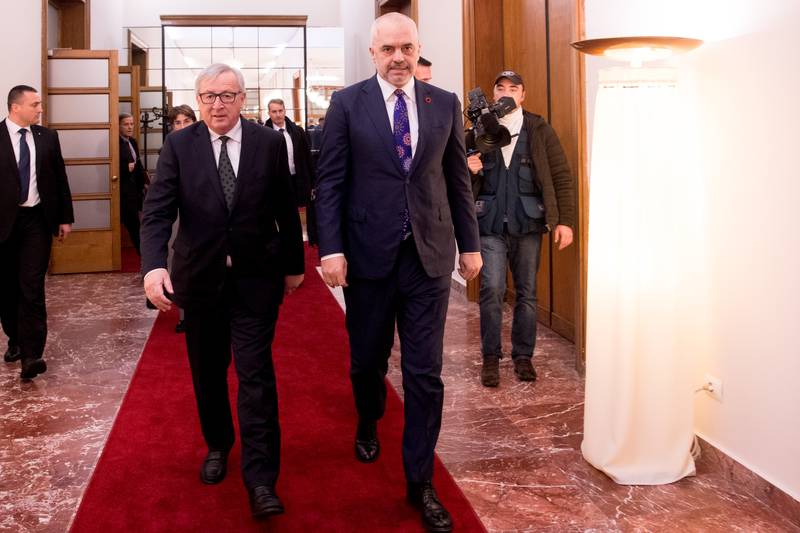 Jean-Claude Juncker's Commission has an issue with dates from the very beginning when, during his election as Commission president, he said that by the end of his term (2019) there would be no further enlargement. And this was completely true, but it would not have turned into a big issue if intense efforts were undertaken to accelerate the preparation of the region for membership. Alas, the Commission did nothing and lost control over the process. Progress, compared to 2014, is insignificant and is restricted to just a few areas. In all the essential ones, namely establishing rule of law, democracy, independent institutions, fight against corruption, independent media and all the things described in Article 2 of the EU Treaty, the region is scoring significant regress. This makes the setting of a date for possible accession completely worthless.
Jean-Claude Juncker's Commission has an issue with dates from the very beginning when, during his election as Commission president, he said that by the end of his term (2019) there would be no further enlargement. And this was completely true, but it would not have turned into a big issue if intense efforts were undertaken to accelerate the preparation of the region for membership. Alas, the Commission did nothing and lost control over the process. Progress, compared to 2014, is insignificant and is restricted to just a few areas. In all the essential ones, namely establishing rule of law, democracy, independent institutions, fight against corruption, independent media and all the things described in Article 2 of the EU Treaty, the region is scoring significant regress. This makes the setting of a date for possible accession completely worthless.
Offering a date is also unnecessary because the process is completely clear - if a candidate country is ready then it will join. On some date for possible accession insisted Serbia President Aleksandar Vucic because this would have helped him blear once again the eyes of Serbian citizens with the aim to consolidate his power. Without being aware what exactly it will achieve with a date, the Commission nonetheless made a concession to Vucic and set 2025 as a conditional date for accession, fully aware that currently there is no candidate that is capable of doing it.
The words of Vucic himself in Belgrade during his joint press conference with Jean-Claude Juncker also showed how inexplicable this date is: "And when I asked him [Juncker] for some possible date which could help us more optimistically to see our future, I knew I was looking for something that is hard to get. That is why, today I don't say that 2025 is a guarantee, but it is possible this to be the year of our accession to the European family if we do the hard work". In addition to the lack of clarity what the idea behind a date is, the Commission was in an explanatory mode that this is in fact a non-date. In each capital city, Mr Juncker was explaining, and his hosts agreed, that 2025 is not a date.
There was even a case when the date served to boost another episode of transborder competition. Albania Prime Minister Edi Rama outlined two scenarios - either will Albania join the EU together with Serbia, despite that Albania has not yet opened negotiations, or it will join before Serbia.
In a package but individually
Another controversial signal Juncker sent to the six countries is that on the one hand, every country will go its own way and will join when it's ready, and, on the other, that they will all go in a package. In the Balkan case, it's about two speeds of accession. The first is not in a package - each country can work on its own, independently of the others, to build rule of law, independent judiciary, free media, etc. The second speed, however, demands the participation of some of the others. This is the speed of resolution of border disputes or, generally, bilateral conflicts. If the six manage to conclude quickly legally binding and threefold guaranteed border agreements among themselves, then they will free their neighbours to work on the other criteria alone. But it could be the other way round - first to build rule of law and then to resolve bilateral disputes, which seems to me less likely.
In all six countries, Jean-Claude Juncker repeated tirelessly than the EU would not accept countries with unresolved disputes and that it is a community of values and rule of law. His PR message was that the time has come to reconcile history and geography. In the same time, though, he was quite engaged with some, whereas he was not with others, which reveals incoherence and lack of understanding how interlinked the problems in the region are - the Kosovo puzzle cannot be resolved with Serbia only, without Albania's cooperation; Bosnia and Herzegovina cannot move forward without Serbia to have or rather stop having influence, and without Croatia; the Macedonian case cannot be resolved without Greece which, being part of the EU, has practically already imported this issue into the EU.
Macedonia - you're doing well but you need to resolve your issues with Greece first
The first stop of Jean-Claude Juncker's tour was in Skopje. In the capital of the former Yugoslav republic, he made probably the most mistakes. First, he admitted that he had not visited since 2003 and immediately afterwards he said that he was in a hurry because he had to leave in an hour and a half for Albania. And it is in Macedonia that he was not supposed to be in a hurry. This is the country that suffered the most from EU's wrong policies so far. In 2005, when it was granted a candidate status, Macedonia was the most prepared of all. However, it did not begin negotiations because Greece vetoed the process due to the unresolved name issue. This pushed the country into developing severe nationalism and authoritarianism which sent the ex-Yugo republic decades back, and last year it narrowly avoided an inter-ethnic conflict.
Ever since Zoran Zaev's government took power, Macedonia is investing huge efforts to catch-up. It made several major concessions towards its neighbours and this fell on fertile ground in Bulgaria with which it finally concluded a friendship agreement that dragged for decades. Then, Skopje stretched a hand to Athens. Negotiations on the name of the former Yugoslav republic have been restarted and are intensively under way. In the same time, the Macedonian government is also working actively on a reforms plan. This is precisely why the country needed encouragement and a strong political 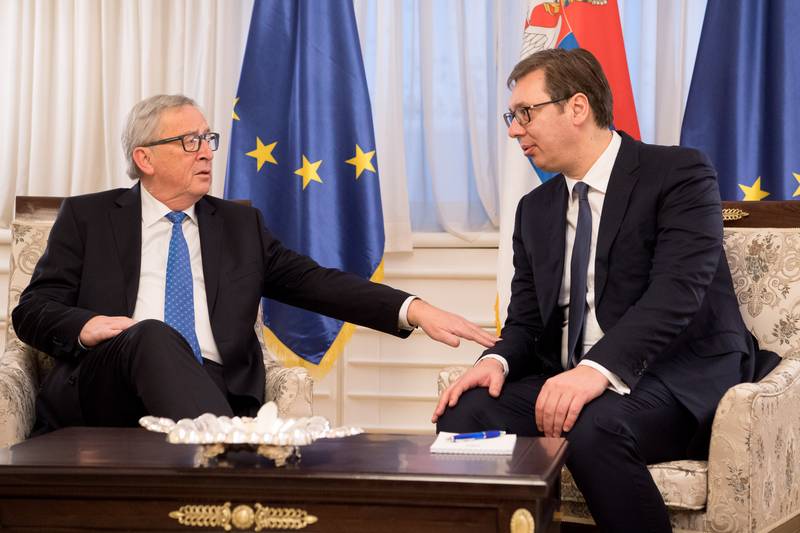 commitment. Prime Minister Zaev hoped that his country will yet this year receive green light to start negotiations, which could additionally encourage Macedonia and take it entirely out of the risk zone.
commitment. Prime Minister Zaev hoped that his country will yet this year receive green light to start negotiations, which could additionally encourage Macedonia and take it entirely out of the risk zone.
Alas, Juncker wasted this opportunity. He expressed satisfaction with the progress the country scored in implementing reforms. He praised Macedonia for its agreement with Bulgaria, but then he poured cold water over his hosts saying: "We have not come here to give you a final date but just to tell you that you are on the right path and that you should continue in the reforms path. In a few months, you will give the Commission an opportunity to send the Council an invitation to open negotiations. But we are not there yet. There are a few steps that need to be done", he said. And for a farewell he added in a Pilate Pontius's way: "Do your job with Greece and Greece to do its job with you".
The message is even more disappointing against the backdrop of the past when the Commission for years was sending recommendations to the Council to start negotiations with Macedonia despite that the then government of Nikola Gruevski was systemically undermining the fragile democratic foundations of the country and was pulling it away from its European path.
Albania - continue the reforms!
Albania was the second stop of Juncker's tour. In Tirana, he specifically underlined the need to work on the fight against organised crime, vetting of judges, organisation of courts and tribunals. He urged not to wait for the last moment to resolve territorial disputes. What he omitted to say, though, was how much efforts the Commission has been investing in its facilitation to resolve Kosovo's fate which the Albanian government maintains very close relations with, and Prime Minister Rama often makes provocative statements that inflame in Serbia fears of a "Greater Albania".
Of course, Juncker is not a babysitter who should constantly reconcile fighting kids but, given that the Commission is strongly committed to the Belgrade-Pristina talks, it would have been good to convey a clear message to Tirana that it, too, has a role for the successful end of the negotiations. It is quite possible that he told the Albanian authorities something of the kind but he omitted to mention it during their joint press conference.
Juncker was a populist with Vucic
Knowing the tempered character of the Serbs, and especially their leader Aleksandar Vucic, who often reduces everything to honour and dignity, Jean-Claude Juncker took the role of a populist by saying in front of the cameras everything Vucic wanted to hear - that Serbia is very important, that everyone is talking about Serbia, that nobody is imposing anything on Serbia ("This visit is not an inspection"), that a lot of reforms have been implemented. In parallel with the praises, Mr Juncker managed to sneak through several well veiled criticisms. He focused on the rule of law and fundamental rights, but in the very beginning he said that he wanted to thank the president like a prince or a royal figure, which undoubtedly is a hint about what Vucic has turned into.
Regarding the Belgrade-Pristina dialogue, Juncker said that the EU expects nothing less than a legally binding agreement but he quickly added that it is not the job of the Union to define what the agreement should contain. Juncker also said that he had a very frank and open discussion with Vucic, which could felt in the statement of Vucic himself: "It will no longer be possible to live in the past as we loved for decades and centuries to talk about our myths and everything that happened 200-300 years ago". The Serbian president knows that the time of choice is coming but he does not want to be alone in that choice. He wants to share the responsibility with the Commission and other global players.
Juncker apologies in Montenegro
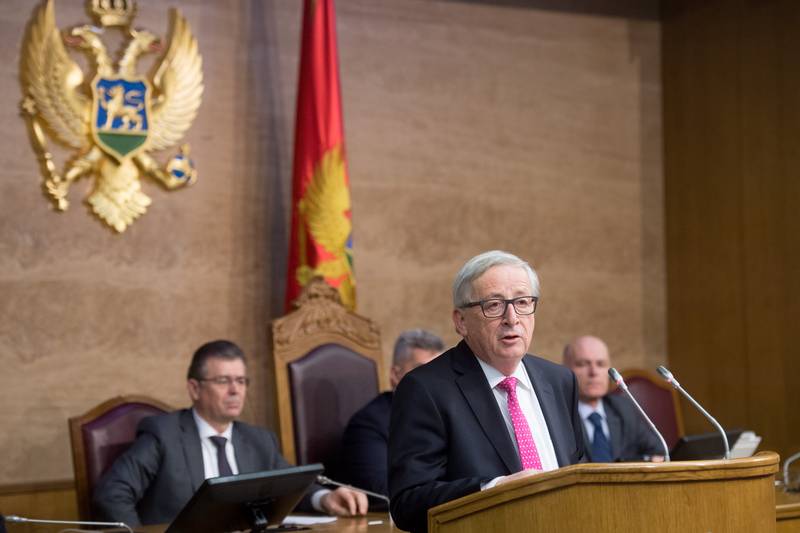 In the country which, for purely technical reasons, is most advanced in the accession process Juncker addressed the Parliament. His speech was boycotted by a part of the opposition. On this occasion he said that he was never a fan of the empty chair policy, meaning the French boycott of 1965 in protest against the institutionalisation of the EU. Later, he did something like an apology for his 2014 remark that there would be no enlargement by the end of his term, saying he received a lot of letters of disappointed citizens of Montenegro. He assured that the EU will have more than 27 member states. Before the Montenegrin MPs, he specifically emphasised on media independence, which is a serious problem in the country.
In the country which, for purely technical reasons, is most advanced in the accession process Juncker addressed the Parliament. His speech was boycotted by a part of the opposition. On this occasion he said that he was never a fan of the empty chair policy, meaning the French boycott of 1965 in protest against the institutionalisation of the EU. Later, he did something like an apology for his 2014 remark that there would be no enlargement by the end of his term, saying he received a lot of letters of disappointed citizens of Montenegro. He assured that the EU will have more than 27 member states. Before the Montenegrin MPs, he specifically emphasised on media independence, which is a serious problem in the country.
Too neutral in Bosnia
The most disappointing Juncker's performance was in Bosnia and Herzegovina. There, he, too, addressed the Parliament, but his speech was weak and too disengaged. He tried to explain to the growingly hostile to each other ethnic groups in the country that patriotism is not nationalism but on the contrary. It is not a contradiction to be in the same time a Luxembourger and a European, he said, hinting that there is no conflict in being a Croat and a Bosnian or a Muslim and a Bosnian or a Serb and a Bosnian. However, given the current situation in BiH, these words come too little too late.
During his visit, he was given the answers to the questionnaire the Commission sent more than a year ago, and which is the first step toward starting accession negotiations. This was a very symbolic act because everyone is aware that BiH has no certain European perspective unless inter-ethnic tensions are reduced and the threat for the survival of the state disappears. Juncker said no word about that and even less about greater EU commitment in a country which is of interest to some EU non-friendly external factors, like Russia and Turkey.
Juncker in Kosovo
The most interesting part of Juncker's visit in the Western Balkan countries was in Kosovo and, more precisely, the public debate in the building of the Pristina municipality. This conversation was a very strong symbolism of the deep ice between the countries in the region and the EU. The meeting was between Juncker, EU foreign policy chief Federica Mogherini (Italy, S&D), enlargement negotiations Commissioner Johannes Hahn (Austria, EPP), the head of the EU Kosovo office Nataliya Apostolova 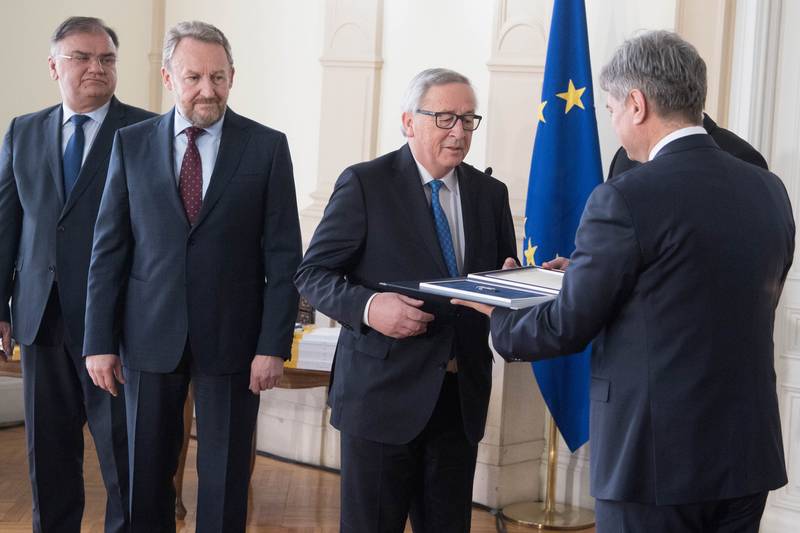 and students, journalists and public figures. It was evident how much unspoken there is between them, how distant these universes are, and how each word is twisted to find something hidden.
and students, journalists and public figures. It was evident how much unspoken there is between them, how distant these universes are, and how each word is twisted to find something hidden.
One of the remarkable episodes from the one-hour long meeting was the exchange of rebukes which later transformed into jokes between a Kosovo journalist, Juncker and Hahn. Everything started with Nataliya Apostolova's announcement that journalists in Kosovo play a very important role. Juncker retorted that this is the case everywhere. Apostolova added that they are also opinion-makers. A Kosovo journalist complained he had no chance to interview neither of the three Europeans. His first question was inspired by Juncker's introductory remarks when he said that he is rather in the mood of listening than talking. "One can remain with the impression that you do not have much to tell us in Kosovo".
Juncker denied saying that this impression is wrong. The second question was about why Kosovo was the last stop of the tour of the six Western Balkan countries and whether this meant that this is the last country to embark on the EU integration train. "Jokes are getting better", Juncker said. This is when Hahn intervened in the exchange proposing media to contribute to avoiding the impression that this region is the leading one in distributing conspiracy and paranoid theories. The fact that Kosovo is the last stop means that "we have kept the best for last", he said. This animated the audience, but just imagine the reactions of, let's say, Serbs.
The most meaningful and strong message to the Western Balkans conveyed Ms Mogherini from Kosovo, saying that it is high time the region to put the past to rest. "The EU started in 1957 and that was exactly 12 years after the end of WWII. So maybe it's time to think of what comes next". According to her, the region is like a small model of the EU and the reasons that led to its conception - peace and reconciliation. The hardest part of the meeting of the three European leaders in Kosovo was to say what comes next when Kosovo and Serbia do their parts of the deal but there are still five member countries that have not yet recognised Kosovo. There was no answer to this question and to the Kosovars it was the more important one than a concrete date for membership.
Actually the Balkans do not ask for much - just more attention
What united all countries in Juncker's tour was that they were all very happy with his visit. In Serbia, the most discussed issue was that, finally, it is being paid attention to from high above. In Albania, Prime Minister Rama said that the visit was a promise delivered. Jean-Claude Juncker's visit is the first of a European Commission president since 2011, when part of the countries in the region were visited by his predecessor Jose Manuel Barroso (Portugal, EPP). Before that, in 2006, Barroso made a full tour of the region. The EU high representative visited all the WB6 countries for the first time last year. She visited some of them separately before.
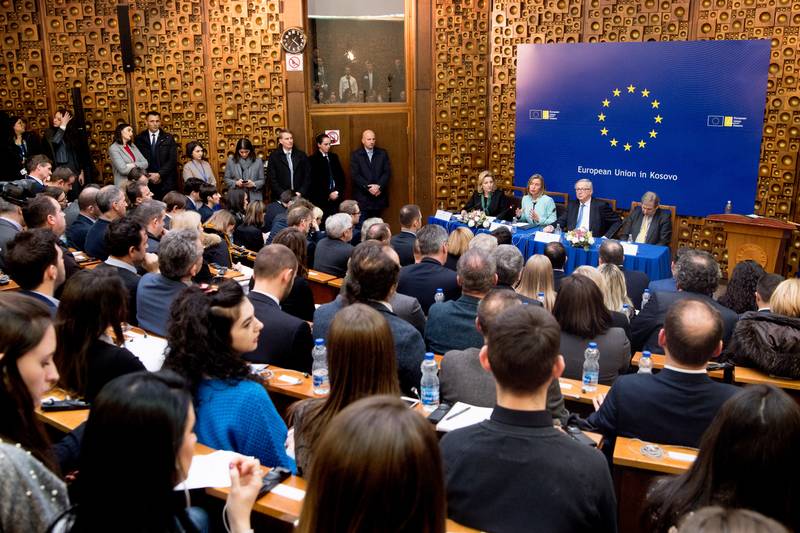 It is no surprise then that, given such a rarity, Juncker's tour was described in the region as an "historic" one. He promised in Belgrade that this visit will not be the last and, hopefully, he will stick to his promise because, whatever documents Brussels adopts, they cannot replace the contacts on the ground, debates with people, answering media questions, monitoring all projects financed with EU money, and most of them are yet to come. A curious detail in Juncker's tour was that he chose to speak French throughout the trip. He himself explained that he was simply in the mood to speak French, reminding that this is one of the EU's official languages.
It is no surprise then that, given such a rarity, Juncker's tour was described in the region as an "historic" one. He promised in Belgrade that this visit will not be the last and, hopefully, he will stick to his promise because, whatever documents Brussels adopts, they cannot replace the contacts on the ground, debates with people, answering media questions, monitoring all projects financed with EU money, and most of them are yet to come. A curious detail in Juncker's tour was that he chose to speak French throughout the trip. He himself explained that he was simply in the mood to speak French, reminding that this is one of the EU's official languages.
This can be seen as a tease with the often stated desire by Serbian officials, when in Brussels, to speak Serbian because "we have the right". But it can also be a manifestation of Juncker's gloating with UK's leaving. Juncker said before that he would be happy if French replaced English as a lingua franca in the EU after Brexit. The message in a region like the Western Balkans, however, could be interpreted also as underlining the distance - a distant Europe that peaks French.
 Bakir Izetbegovic, Andrej Plenkovic | © Council of the EU
Bakir Izetbegovic, Andrej Plenkovic | © Council of the EU Aleksandar Vucic, Recep Tayyip Erdogan | © Serbian Presidency
Aleksandar Vucic, Recep Tayyip Erdogan | © Serbian Presidency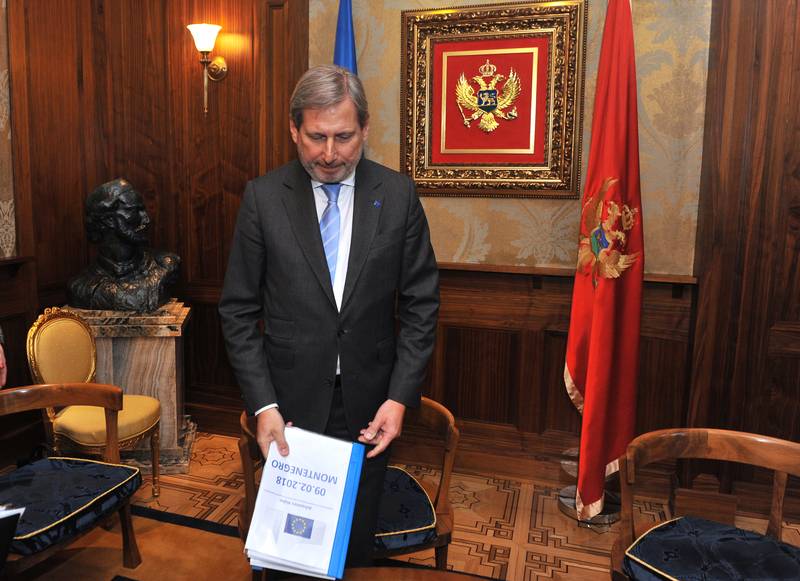 Johannes Hahn | © European Commission
Johannes Hahn | © European Commission